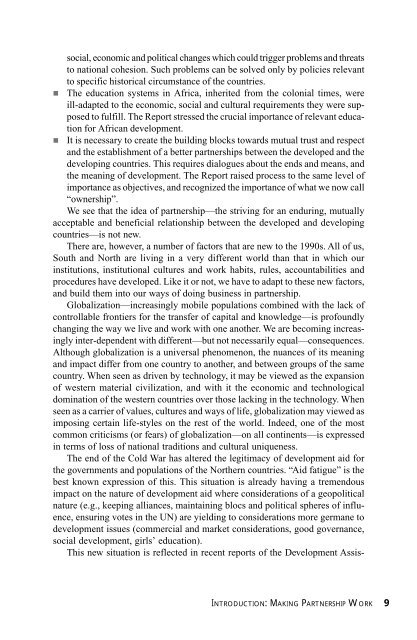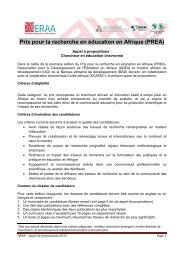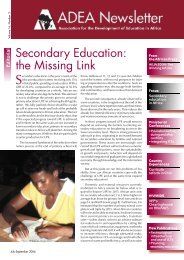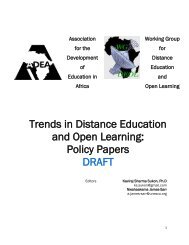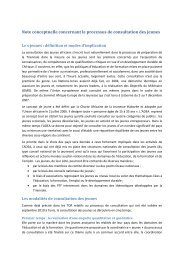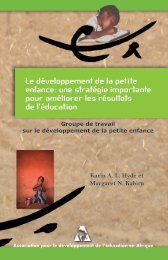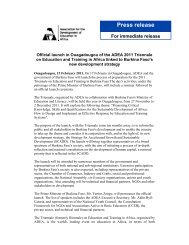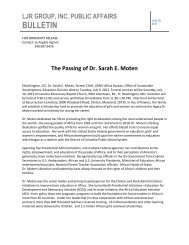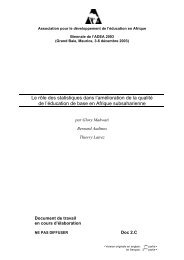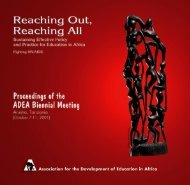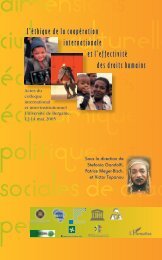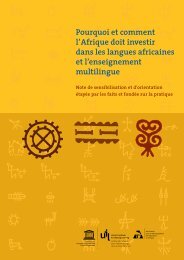Partnerships for Capacity Building and Quality ... - ADEA
Partnerships for Capacity Building and Quality ... - ADEA
Partnerships for Capacity Building and Quality ... - ADEA
Create successful ePaper yourself
Turn your PDF publications into a flip-book with our unique Google optimized e-Paper software.
social, economic <strong>and</strong> political changes which could trigger problems <strong>and</strong> threatsto national cohesion. Such problems can be solved only by policies relevantto specific historical circumstance of the countries.! The education systems in Africa, inherited from the colonial times, wereill-adapted to the economic, social <strong>and</strong> cultural requirements they were supposedto fulfill. The Report stressed the crucial importance of relevant education<strong>for</strong> African development.! It is necessary to create the building blocks towards mutual trust <strong>and</strong> respect<strong>and</strong> the establishment of a better partnerships between the developed <strong>and</strong> thedeveloping countries. This requires dialogues about the ends <strong>and</strong> means, <strong>and</strong>the meaning of development. The Report raised process to the same level ofimportance as objectives, <strong>and</strong> recognized the importance of what we now call“ownership”.We see that the idea of partnership—the striving <strong>for</strong> an enduring, mutuallyacceptable <strong>and</strong> beneficial relationship between the developed <strong>and</strong> developingcountries—is not new.There are, however, a number of factors that are new to the 1990s. All of us,South <strong>and</strong> North are living in a very different world than that in which ourinstitutions, institutional cultures <strong>and</strong> work habits, rules, accountabilities <strong>and</strong>procedures have developed. Like it or not, we have to adapt to these new factors,<strong>and</strong> build them into our ways of doing business in partnership.Globalization—increasingly mobile populations combined with the lack ofcontrollable frontiers <strong>for</strong> the transfer of capital <strong>and</strong> knowledge—is profoundlychanging the way we live <strong>and</strong> work with one another. We are becoming increasinglyinter-dependent with different—but not necessarily equal—consequences.Although globalization is a universal phenomenon, the nuances of its meaning<strong>and</strong> impact differ from one country to another, <strong>and</strong> between groups of the samecountry. When seen as driven by technology, it may be viewed as the expansionof western material civilization, <strong>and</strong> with it the economic <strong>and</strong> technologicaldomination of the western countries over those lacking in the technology. Whenseen as a carrier of values, cultures <strong>and</strong> ways of life, globalization may viewed asimposing certain life-styles on the rest of the world. Indeed, one of the mostcommon criticisms (or fears) of globalization—on all continents—is expressedin terms of loss of national traditions <strong>and</strong> cultural uniqueness.The end of the Cold War has altered the legitimacy of development aid <strong>for</strong>the governments <strong>and</strong> populations of the Northern countries. “Aid fatigue” is thebest known expression of this. This situation is already having a tremendousimpact on the nature of development aid where considerations of a geopoliticalnature (e.g., keeping alliances, maintaining blocs <strong>and</strong> political spheres of influence,ensuring votes in the UN) are yielding to considerations more germane todevelopment issues (commercial <strong>and</strong> market considerations, good governance,social development, girls’ education).This new situation is reflected in recent reports of the Development Assis-INTRODUCTION: MAKING PARTNERSHIP WORK 9


